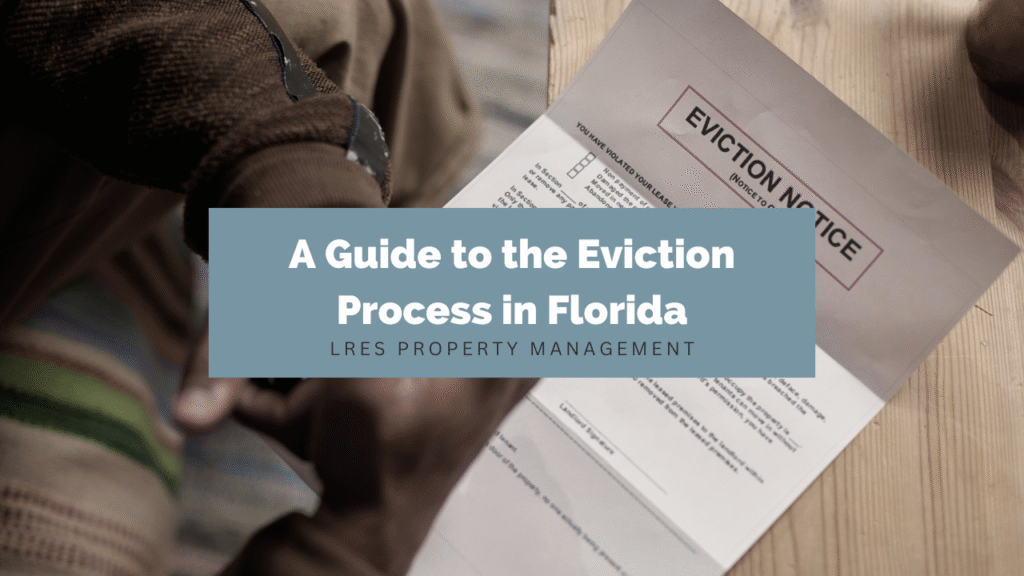Key Takeaways
- Evictions in Florida must follow strict legal procedures outlined in Chapter 83, Part II of the Florida Statutes, improper actions can result in serious penalties.
- Serving the correct eviction notice based on the type of lease violation (nonpayment, no lease, or misconduct) is essential to avoid delays or dismissal in court.
- LRES Property can help landlords navigate the eviction process and manage their rental properties professionally, ensuring compliance and protecting their investment.
Evicting a tenant in Florida is a legal process that must be handled with care. While landlords have the right to remove tenants for valid reasons, doing so improperly can lead to costly legal consequences.
In Florida, the eviction process is governed by Chapter 83, Part II of the Florida Statutes. As a landlord, it’s essential to follow this process step-by-step to avoid delays, fines, or claims of wrongful eviction.
Unlawful actions, like changing the locks, shutting off utilities, or removing a tenant’s belongings, are strictly prohibited and can result in significant penalties.
To help you stay compliant and protect your investment, LRES Property Management has put together this comprehensive guide covering everything you need to know about legally evicting a tenant in Florida.
GET A FREE RENTAL ANALYSIS
What’s the Eviction Process in Florida?
In Florida, an eviction typically takes about three weeks to complete. However, the process can take longer if the tenant contests the eviction or if the landlord makes legal errors.
To avoid delays or complications, it’s important to follow the proper procedures step by step.

Notice for Lease Termination with Legal Cause
Florida law requires landlords to have legal grounds before starting an eviction. Valid reasons include:
- Nonpayment of rent.
- Staying after the lease has expired.
- Violating lease terms.
- Committing illegal activity on the property.
Once you’ve identified a legal cause, you must serve the tenant with the correct type of eviction notice based on the violation.
Types of Eviction Notices in Florida
3-Day Notice for Nonpayment of Rent
This notice applies when a tenant fails to pay rent on time. In Florida, rent is typically due on the first of the month unless stated otherwise in the lease. There is no legally required grace period unless specified in the lease agreement.
If the rent remains unpaid, you may serve a 3-Day Notice to Pay or Vacate, giving the tenant three business days (excluding weekends and legal holidays) to pay the rent or move out.
30-Day Notice for Tenants Without a Lease
Tenants without a lease, often referred to as “tenants at will”, can be evicted at any time with proper notice.
Florida law requires you to serve a 30-Day Notice to Terminate Tenancy. If the tenant remains after 30 days, you may file an eviction lawsuit.

7-Day Notice for Curable Lease Violations
Tenants are expected to follow rules outlined in their lease agreements. Common rules include:
- Maintaining cleanliness and sanitation.
- Allowing landlord access when required.
- Promptly reporting maintenance issues.
- Keeping noise at acceptable levels.
If the tenant violates any of these, you may issue a 7-Day Notice to Cure or Vacate, giving them an opportunity to correct the issue within seven days.
7-Day Notice for Irreparable Damage or Repeat Violations
For serious or repeated lease violations, such as substantial property damage or multiple lease breaches within 12 months, you can issue a 7-Day Unconditional Quit Notice. This notice is not curable, and the tenant must vacate within seven days.
LEARN ABOUT OUR PROPERTY MANAGEMENT SERVICES
Serving the Eviction Notice
Florida law outlines acceptable methods for serving eviction notices. You may:
- Deliver it to the tenant in person.
- Leave a copy at the rental unit (if the tenant is unavailable).
- Send it by mail.
Always keep a copy of the notice and a declaration of service for your records. These may be required if the case proceeds to court.
Tenant Eviction Defenses
Tenants have the right to contest an eviction by filing a response with the court. Common defenses in Florida include:
- Self-help eviction: The landlord illegally locked out the tenant, shut off utilities, or removed belongings.
- Violation was cured: The tenant resolved the issue stated in the notice.
- No violation occurred: The landlord made a false or inaccurate claim.
- Retaliation: The eviction was in response to the tenant asserting legal rights.
- Discrimination: The eviction was based on a protected class under the Fair Housing Act.
- Defective notice: The eviction notice contained major errors.
If the court finds any of these defenses valid, the eviction may be denied.

Court Hearing and Writ of Possession
If the tenant does not respond or if the court rules in your favor, you will receive a Writ of Possession. This court order allows the sheriff to remove the tenant if they refuse to leave voluntarily.
In many cases, a default judgment will be issued if the tenant doesn’t respond. Otherwise, a judge will assess the facts during the hearing before issuing a final decision.
Once the Writ is issued, the sheriff will post a 24-hour notice. If the tenant remains beyond that period, they will be forcibly removed, and the property will be returned to your control.
Handling the Security Deposit After an Eviction
Once the tenant has vacated, either voluntarily or through a court-ordered eviction—you must handle the security deposit according to Florida law.
You have 15 days to return the full deposit if there are no deductions, or 30 days to provide written notice if you plan to withhold any portion for damages, unpaid rent, or other valid charges.
Failing to follow these rules could result in legal penalties, including having to return the full deposit plus damages. Document any deductions with photos, receipts, or repair invoices to support your claim.
Conclusion
Evictions must be handled according to Florida law to avoid costly delays and legal consequences. From serving the correct notice to navigating potential tenant defenses, following the proper process is essential.
LRES Property Management is here to help you manage your Orlando rental property with professionalism and care.
We specialize in protecting your investment, ensuring compliance, and delivering top-tier service to both landlords and tenants. Contact us today to learn how we can support your rental success.
LEARN MORE ABOUT OUR TRUSTED TEAM
Disclaimer: This blog should not be used as a substitute for legal advice from a licensed attorney in your state. Laws frequently change, and this post might not be updated at the time of your reading. Please contact us for any questions you have regarding this content or any other aspect of your property management needs.

